Have you heard of anti-Japanese propaganda “Japanese BRUTAL rule over Korea” ? This is completely a lie. Do we have to distort a history to be nice to others? NO. The history is history. You can't bring your own agenda to it. So this is it.
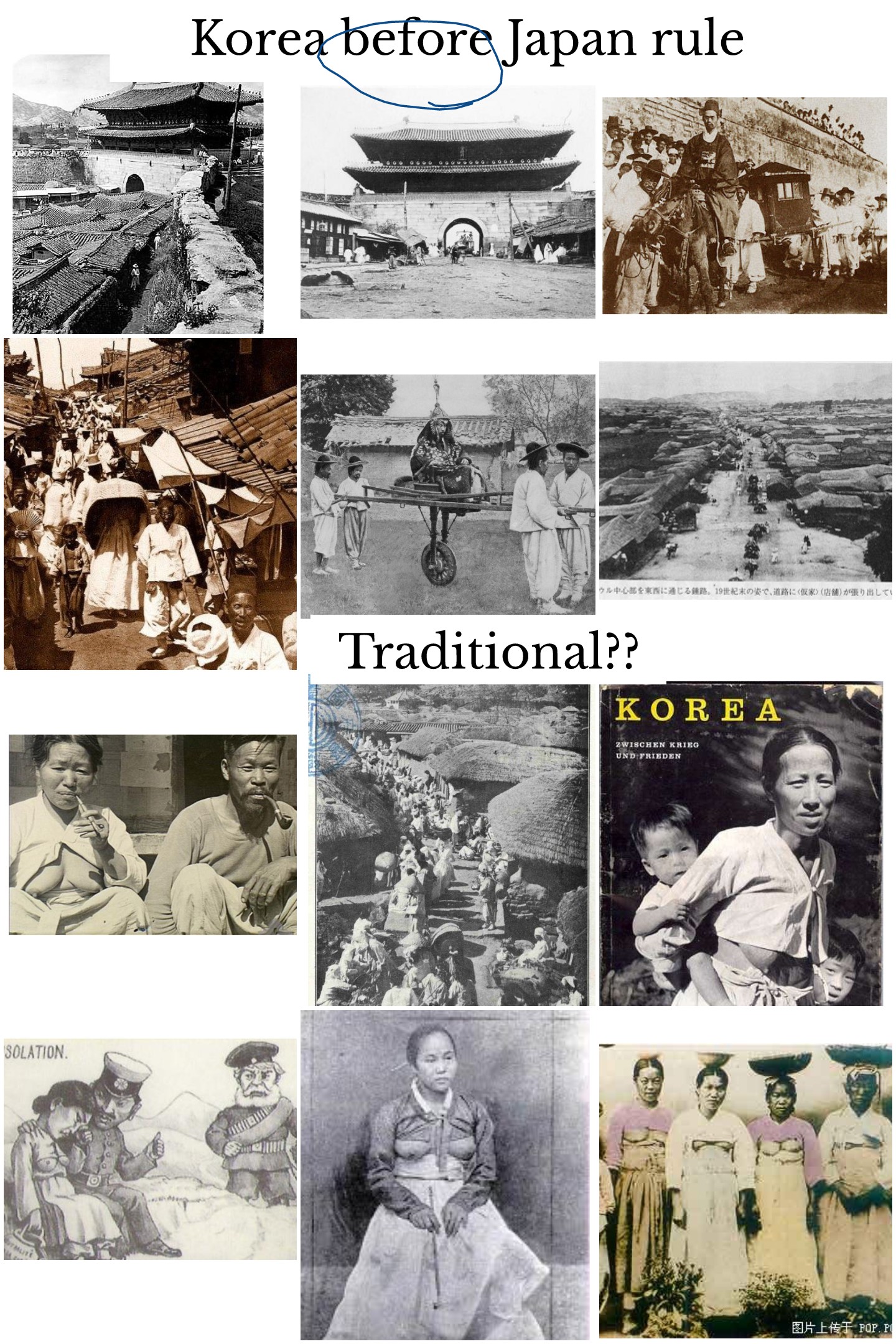
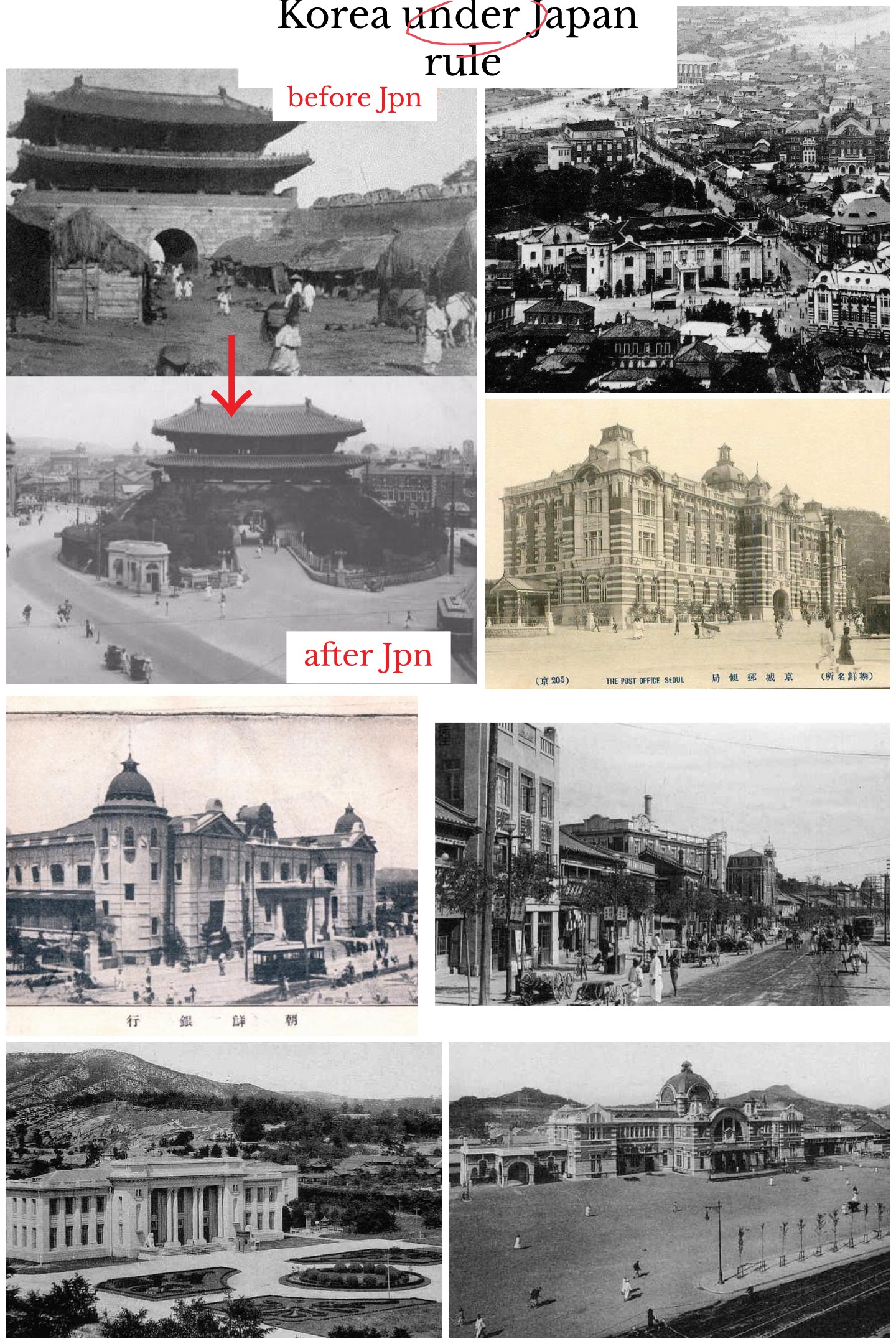
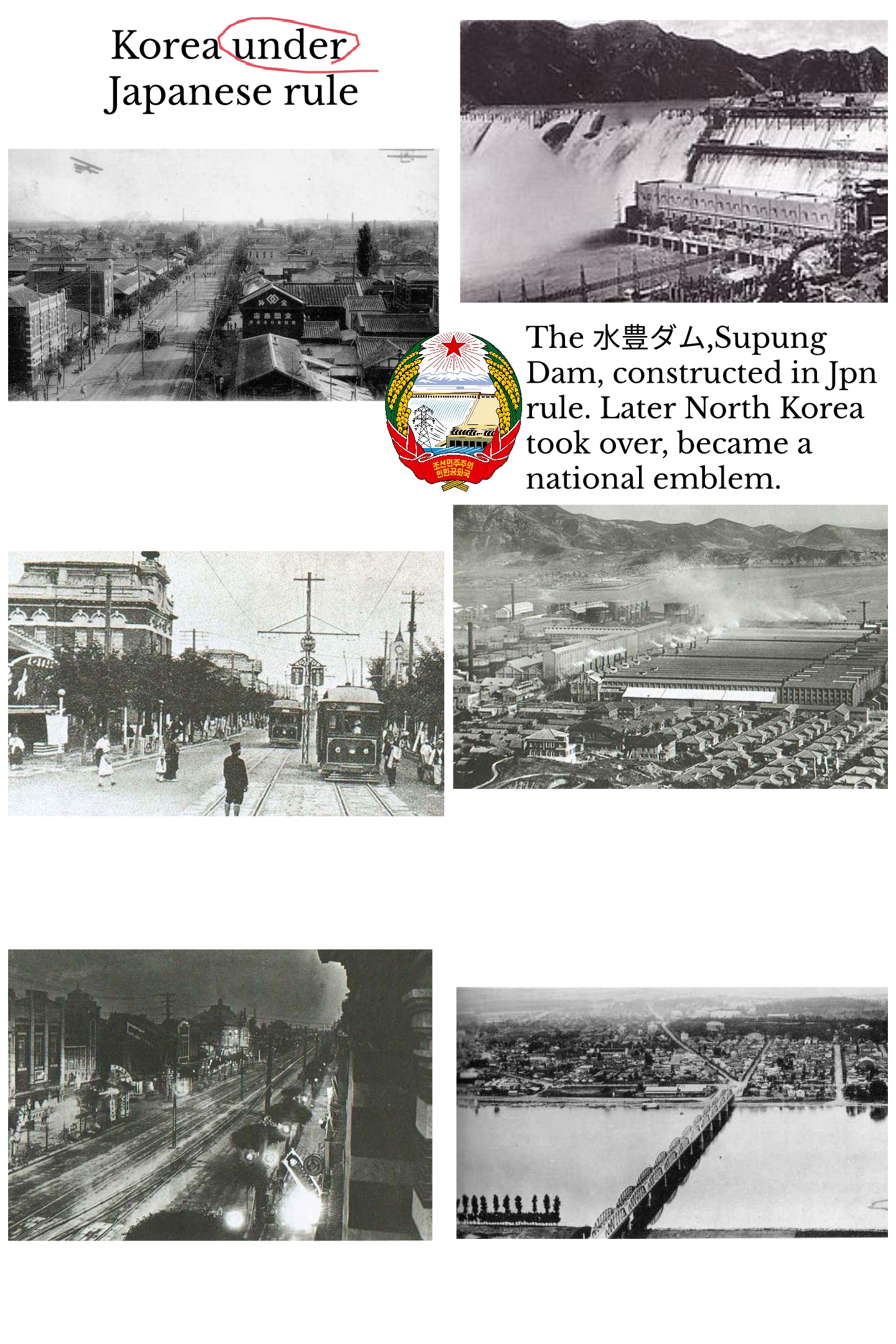
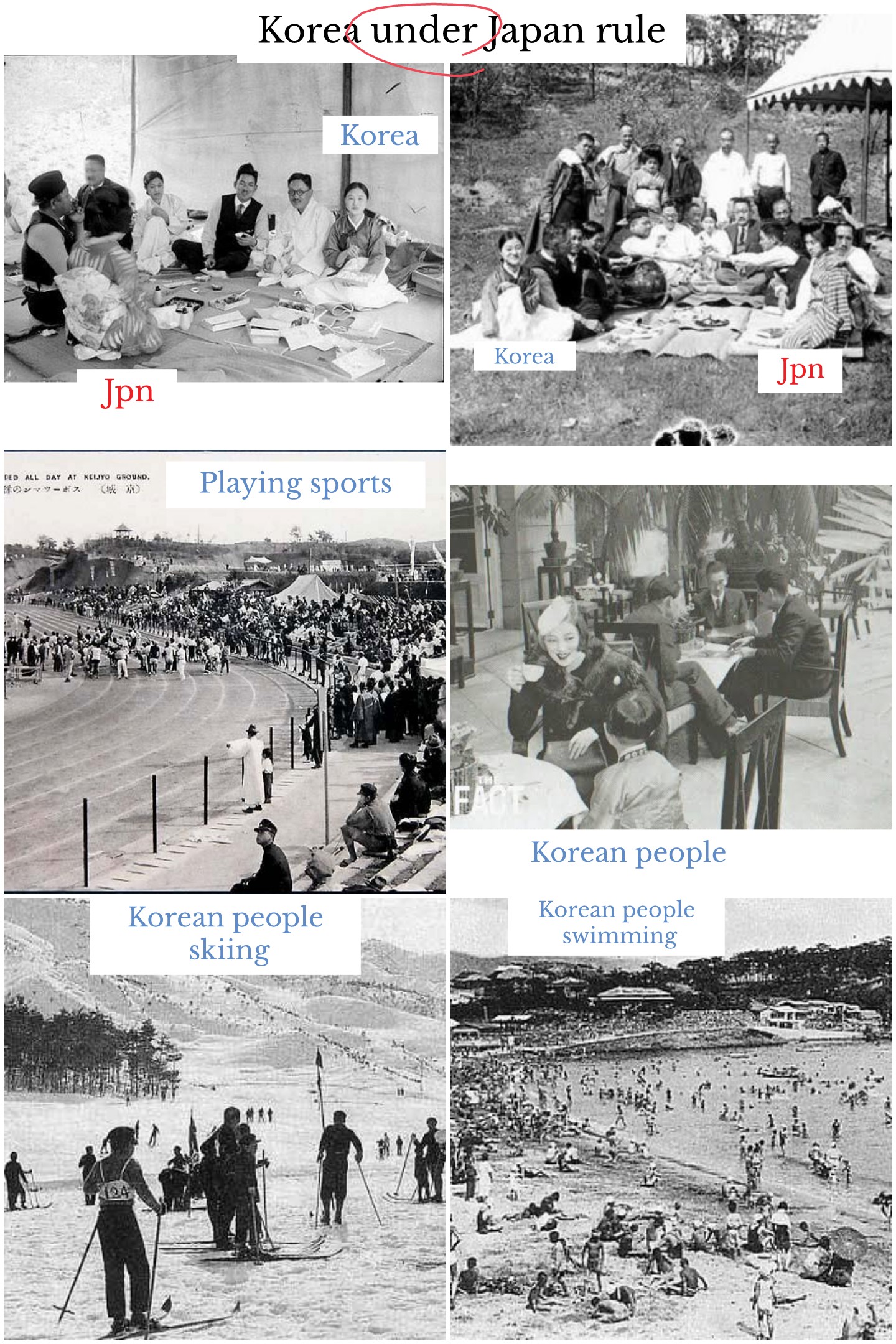
Currently in Korea, anyone who speaks in favor of Japanese annexation period faces the attack verbally or even physically by anti-Japanese Koreans as below.
|
95 years old Korean says " I fondly recall the period of the Japanese rule. It was fortunate for Korea to have been ruled by Japan.", and he was beaten to death by an angry 35 years old Korean . Segye Ilbo (World Daily) on September 12, 2013 Professor Choe Ki-ho says " I am 92 years old, and I want to tell you the truth" . “ I want to tell you the truth. Telling the truth could threaten my life in South Korea, but I feel it is my duty to do so.” “Nowadays the Koreans who speak positively of the Japanese are criticized as "Chinilpa (pro-Japanese)" but in those days over 90% of Koreans were pro-Japanese.” https://scholarsinenglish.blogspot.com/2014/10/i-am-91-years-old-and-i-want-to-tell.html |
The truth is if you consider the three periods of Korea in a modern era, Japanese annexation period was the best for Korean people as described in US president Hoover described in his book "Freedom Betrayed".
| ~1910 : The miserable Yi dynasty era |
| 1910 to 1945 : During Japanese annexation, revolutionized Korea with Japan |
| 1945~ current: After the world war 2, the split into North and South and annihilated with US air raid at Korean war causing the death of 20 percent of people. |
¶ ~1910 : The miserable Yi dynasty era 李氏朝鮮
These are testimonies and how Westerners saw.
📕 Freedom Betrayed: Herbert Hoover's Secret History of the Second World War and Its Aftermath by George H. Nash
THE HISTORY OF KOREA is largely one of conflicts between China on the west and Japan on the east of this 6oo miles of a peninsula extending south from Manchuria. Neither the Yellow Sea to the west or the Sea of Japan have afforded them much protection as they have never been a [illegible word-ed. people. In fact the Koreans, being a race without aggressive or military instincts, their independence has been most uncertain. Recorded history of Korea reaches back for over 2,000 years. It was united into a kingdom in 669 A.D. For centuries, Korean allegiance was mostly to China. But in 1895, in a war between Japan and China, the victorious Japanese exacted a declaration of Korean independence from China. Ten years later, in 1905, in the Russo-Japanese War, the victorious Japanese occupied Korea militarily, and in 1910 formally annexed it. Japan's possession of Korea ended with her defeat in the Second World War, in August, 1945.
I first visited Korea in 1910 [1909-ed.], to advise some Japanese industrialists on engineering matters. The Korean people at that time were in the most disheartening condition that I had witnessed in any part of Asia. There was little law and order. The masses were underfed, under-clothed, under-housed and under-equipped. There was no sanitation, and filth and squalor enveloped the whole countryside. The roads were hardly passable, and there were scant communication or educational facilities. Scarcely a tree broke the dismal landscape. Thieves and bandits seemed to be unrestrained.
During the thirty-five years of Japanese control, the life of the Korean people was revolutionized. Beginning with this most unpromising human material, the Japanese established order, built harbors, railways, roads and communications, good public buildings, and greatly improved housing. They established sanitation and taught better methods of agriculture. They built immense fertilizer factories in North Korea which lifted the people's food supplies to reasonable levels. They reforested the bleak hills. They established a general system of education and the development of skills. Even the dusty, drab and filthy clothing had been replaced with clean bright colors.
📕Korea from Its Capital: With a Chapter on Missions, by George William Gilmore
Page.88
Koreans are wretchedly poor; poor not merely according to our standard, but judged by one much lower. One gauge of this poverty is afforded by their scale of wages.
Page. 92
The people have been much maligned in the matter of cleanliness. In the East one learns to beware of aphorisms. Foreigners like to be witty at the expense of natives. So an Englishman was once heard to say that the dirtiest man he ever saw was a clean Korean. The impression the speaker meant to convey was that Koreans are the dirtiest people on earth.
📕KOREA: A DEGENERATE STATE, by GEORGE KENNAN
Special Correspondent for The Outlook in the Fat East
The first thing that strikes a traveler in going from Japan to Korea is the extraordinary contrast between the cleanness, good order, industry, and general prosperity of one country, and the filthiness, demoralization, laziness, and general rack and ruin of the other. The inhabitants of the two empires seem to be ethnologically related, and they resemble each other somewhat in color and in physical type; but in moral and intellectual characteristics they are as far apart as the Dutch and the Venezuelans. The Japanese are clean, enterprising, intelligent, brave, well educated, and strenuously industrious, while the Koreans strike a newcomer as dirty in person and habits, apathetic, slow-witted, lacking in spirit, densely ignorant, and constitutionally lazy.
So far as history enables one to judge, the two peoples had a fair and equal start, and there is reason to believe that at first the Koreans took the lead; but, as a result of the feudal system, and of other causes not fully and clearly ascertainable, Japan advanced, improved, and eventually developed a high type of individual and national character, while Korea gradually declined, lost what character and culture she had,
📕Corea, The Hermit Nation, by Matthew Calbraith Perry
THE inhabitants of the Hermit Kingdom are peculiarly proficient in the art of doing nothing gracefully.
📕HISTOIRE DE L'EGLISE DE CORÉE PRÉCÉDÉE D'UNE
INTRODUCTION, PAR CH. DALLET
Condition des femmes. - Mariage.
En Corée, comme dans les autres pays asiatiques, les mœurs sont effroyablement corrompues, et par une suite toute natu-relle, la condition ordinaire de la femme est un état d'abjection et d'infériorité choquantes. Elle n'est point la compagne de l'homme, elle n'est qu'une esclave, un instrument de plaisir ou de travail, à qui la loi et les mœurs ne reconnaissent aucun droit et, pour ainsi dire, aucune existence morale. C'est un principe généralement admis, consacré par les tribunaux, et que personne ne songe à contester, que : toute femme qui n'est pas sous puissance de mari ou de parents, est, comme un animal sans maitre, la propriété du premier occupant.
📕 THE NEW KOREA, by Ireland, Alleyne
The time Japan annexed Korea, in 1910, the actual conditions of life in the Peninsula were extremely bad. This was not due, however, to any lack of inherent intelligence and ability in the Korean race, but to the stupidity and corruption which for five hundred years had, almost continuously, characterized the government of the Korean dynasty, and to the existence during that period of a royal court which maintained throughout Korea a system of licensed cruelty and corruption.
At the time of the annexation of Korea, his late Majesty the Emperor Meiji of Japan authorized the setting aside of 30 million yen from the Imperial treasury for the benefit of his new Korean subjects. Of this sum, 17,398,000 yen was invested as a permanent fund and distributed among various provinces. The interest, amounting to nearly 900,000 yen annually, is devoted to various forms of social service throughout the Peninsula.
📕 Korea and Her Neighbors by Isabela Bird
The cleansing of the Augean stable of the Korean official system, which the Japanese had undertaken, was indeed an Herculean labor. Traditions of honor and honesty, if they ever existed, had been forgotten for centuries. Standards of official rectitude were unknown. In Korea when the Japanese undertook the work of reform there were but two classes, the robbers and the robbed, and the robbers included the vast army which constituted offi-cialdom. "Squeezing" and peculation were the rule from the highest to the lowest, and every position was bought and sold.
(Note: Above is even before Japanese annexation in 1910, Japan supported Korea for a better nation. )
📕 Defining and Defending the Open Door Policy: Theodore Roosevelt and China by Gregory Moore
The United States might not have been able to act in order to preserve Korean independence, but that made little difference as the (Theodore) Roosevelt administration obviously did not care to do anything. "We cannot possibly interfere for the Koreans against Japan," Roosevelt wrote to Hay late in January of 1905, "they couldn't strike one blow in their own defense." In another letter to Hay a few days later, the president added: "Japan ought to have a protectorate over Korea (which has shown an utter inability to stand by itself). As Japan prepared to place Korea under its suzerainty, the Korean emperor sent a lengthy letter in secret to Roosevelt in which he made an impassioned plea to the president to use his influence with Japan to prevent it from taking over Korea's foreign affairs." Roosevelt told Root that because the letter had been sent in secret and that the Korean representatives to the United States knew nothing about it, it would not be possible to treat the document as an official communication. Additionally, the United States had been informed that Korea had arranged to allow Japan to secure control over its forcign policy. "All things considered. I do not see that any practical action on the letter is open to us," Roosevelt concluded.
¶ 1910 to 1945 : During Japanese annexation, revolutionized Korea by Japan
These are videos taken by the railroad company showing the amazing life of Korean people during Japanese annexation.
(Movie) The life of Korea at Japanese annexation
<a href="www.yahoo.com">ayhooa.com</a> <a href="www.yahoo.com">ayhooa.com</a>
<video autobuffer="true" controls="true" width="50%" height="50%"
poster="http://justiceforjapan.sakura.ne.jp/media/video/Korea/KoreaAnnexation2_cover.png" controls>
<source src="http://justiceforjapan.sakura.ne.jp/media/video/Korea/KoreaAnnexation2.mp4" type="video/mp4">
</video>
<p> </p>
<video autobuffer="true" controls="true" width="50%" height="50%"
poster="http://justiceforjapan.sakura.ne.jp/media/video/Korea/KoreaAnnexation4_cover.png" controls>
<source src="http://justiceforjapan.sakura.ne.jp/media/video/Korea/KoreaAnnexation4.mp4" type="video/mp4">Finally a new Korean king, Sujon realized the situation around him and his nation Korea, he officially agreed on the annexation by Japan. Note: There was NO WAR between Japanese and Korea.
🗒️The Late Korean Emperor's Rescript on Cession of Sovereignty (Promulgated on August 29, 1910)
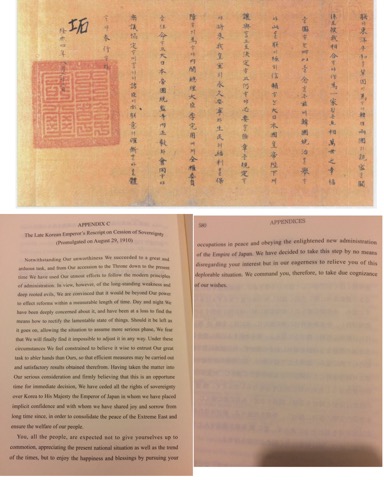
Notwithstanding Our unworthiness We succeeded to a great and arduous task, and from Our accession to the Throne down to the present time We have used Our utmost efforts to follow the modern principles of administration. In view, however, of the long-standing weakness and deep rooted evils, We are convinced that it would be beyond Our power to effect reforms within a measurable length of time. Day and night We have been deeply concerned about it, and have been at a loss to find the means how to rectify the lamentable state of things. Should it be left as it goes on, allowing the situation to assume more serious phase, We fear that We will finally find it impossible to adjust it in any way. Under these circumstances We feel constrained to believe it wise to entrust Our great task to abler hands than Ours, so that efficient measures may be carried out and satisfactory results obtained therefrom. Having taken the matter into Our serious consideration and firmly believing that this is an opportune time for immediate decision, We have ceded all the rights of sovereignty over Korea to His Majesty the Emperor of Japan in whom we have placed implicit confidence and with whom we have shared joy and sorrow from long time since, in order to consolidate the peace of the Extreme East and ensure the welfare of our people.
You, all the people, are expected not to give yourselves up to commotion, appreciating the present national situation as well as the trend of the times, but to enjoy the happiness and blessings by pursuing your occupations in peace and obeying the enlightened new administration of the Empire of Japan. We have decided to take this step by no means disregarding your interest but in our eagerness to relieve you of this deplorable situation. We command you, therefore, to take due cognizance of our wishes.
Korean king, Sujon felt relieved, now Korean royal is the safe from his people or attack from foreign countriesas long as Japan was there.
📕 Memorandun of Conversatin. with Mr Konlya, Vice-Minister of Coreen Imperial
Household.
I have just had the
As to his means of existence, Mr Komiya told me that an allowance of Yen 300,000 was paid to the Bx-Emperor perannum but that he, invarlably got short of cash and made constant demands in excess of that sun on the Exchequer of the Imperial Household and that it was now a 10,000 Yen and then a 20,000 Yen that he required to pay his debts. Whenever possiu-were scraped up and handed over to pay his creditors. Ankad why the Ex-Eaperor was snort of funds,
🗒️ Post WW2 declassified US document
II. NATURE OF KOREAN INTEREST IN THE PEACE SETTLEMENT
The Japanese annexation of Korea by Treaty in 1920 was recognized by almost all countries, including the US, and no general recognition was given any Korean state or government until 1948. Resistence to Japanese rule within Korea was restricted to localized or brief disorders; the people generally, albeit grudgingly, nocepted the rule of the Japanese Government General. The rival Korean nationalistorganizations outside Kores, most of which were established after World War I, were not given any formal international reoognition and appear to have had very little force in the homeland.
🗒️No. 1. Mr. Takaaki Kato to Sir Edward Grey.— (Received August 25.)
Sir,
UNDER instructions, I have the honour to transmit to you the Declaration of the Imperial Government, the text of which is herewith enclosed, in connection with the annexation of Corea to the Empire of Japan, as communicated to you in my note of even date.
I have, &e. TAKAAKI KATO.
————————————-
Enclosure in No. 1.
Declaration of the Imperial Government as to the Annexation of Corea to the Empire of Japan.
(Confidential.
NOTWITHSTANDING
earnest and laborious work of reform in administration of Corea, in which the Governments of Japan and Corea have been engaged for more than four years, since the conclusion of the agreement of 1905, the existing system of government in that country has not proved entirely equal to the duty of preserving public order and tranquillity, and, in addition, the spirit of suspicion and misgiving dominates the whole peninsula.
In order to maintain peace and stability in Corea, to promote the prosperity and welfare of Coreans, and at the same time to ensure the safety and repose of foreign residents, it has been made abundantly clear that fundamental changes régime of government are absolutely essential.
The Governments of Japan and Corea, being convinced of the urgent necessity reforms responsive to the requirements of the situation and of furnishing sufficient guarantee for the future, have, with the approval of His Majesty the Emperor of Japan and His Majesty the Emperor of Corea, concluded through their respective plenipotentiaries a treaty providing for complete annexation of Corea to the Empire of Japan. By virtue of that important Act, which shall take effect on its promulgation on the 29th August, 1910, the Imperial Government of Japan undertake the entire government and administration Corea
, and they hereby declare that the matters relating to foreigners and foreign trade in Corea shall be conducted in accordance with the following rules
📕 JAPAN KOREA AND FORMOSA by F. M. TRAUTZ
The Koreans are physically and mentally a peculiar type with an interesting language of their own. Although they are tall, powerful and meat-eaters, they are anything but savage and rough in their behaviour.
In their attitude towards life and in their industrial methods they are extremely conservative. It is due to Japanese administration that hygiene, schools and economies have greatly developed.
📕 My Voyage in Korea by M Eissler 1918
page:25
Since the Japanese occupation the status of the women is raised to a higher level and it is not so easy to get rid of an obstreperous wife.
page.78
can be seized and held as prisoners until the trial of the case and can be tortured so as to get the testimony out of them. 👉Korea had no lawyers till the Japanese occupation, therefore the criminal has to conduct his own case. The witnesses to avoid torture will testify what the Judge wants to know and the difficulty they were under was for the witnesses to find out what the Judge wanted them to testify to.
📕IN KOREAN WILDS AND VILLAGES by STEN BERGMAN, Translated by FREDERIC WHYTE
The Koreans have both a spoken language and a written language of their own, both of which differs entirely from Chinese and Japanese. Korean, like Japanese, is polysyllabic and its grammar resembles that of Japanese, but it has almost no likeness to it in other respects.
The Korean is not delighted with the Japanese rule but he finds that things go well with him and he is quite ready to admit that Japan has done a great deal for the welfare of the country and has created greater possibilities for him.
If Japan had not taken Korea, either Russia or China would have done so for the country was in a demoralized condition and unable to look after itself. Enlightened Koreans take the view therefore that Japan's annexation of the country was the only thing possible for their welfare, even if they feel that she has gone a little too far in many cases.
📕
But since Japan happened to be the nation to resist the Russian advance in the Far East, one may call attention to the historical fact that Japan had made more real progress in five decades of contact with the Western world than Russia had made in five centuries. Japan was far from perfect, but it was better for the interests of mankind that Korea and lower Manchuria should develop under Japanese influence than under Russian.
📕 Last Words on Korea, Korea and Her Neighbours, by Isabella Bird
I believe that Japan was thoroughly honest in her efforts; and though she lacked experience, and was ofttimes rough and tactless, and aroused hostile feeling needlessly, that she had no intention to subjugate, but rather to play the rôle of the protector of Korea and the guarantor of her independence.
¶ 1945~current: After the world war 2, Korea got split into North & South and got annihilated with US air raid
After Franklin Roosevelt'(FDR) forcing Japan to attack on Pear Harbor, WW2 started. Luckly Korea was safe without any air raid by US bomber. But FDR who caught up with the idea of a new world order with Soviet ignored Japanese attempt for a peace negotiation two days before meeting with Stalin at Yalta and foolishly asked Stalin to join a war against Japan giving him Manchuria(Manchu homeland in North East of China). This led the spread of communisms over East Asia as in East Europe, and after FDR died with illness in an anger realizing Stalin betrayed him , on the next president Truman, the conflict between the US and Soviet started leading to the split of Korea into North and South and the beginning of Korean War.
Lemay says “20 percent if Koreans were killed.”